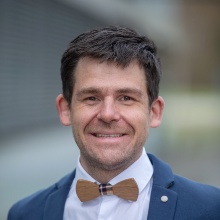Lithium ion batteries are widely used and are durable and safe when handled properly. However, these batteries reach their limits when short charging times using high current densities are to be achieved. “They are simply too expensive for large stationary energy storage facilities and, currently, they are at best a temporary solution for stabilizing the power grid,” says Oliver Clemens.
Among other things, the 38-year old materials scientist is doing research into fluoride ion batteries as a possible successor technology. These are of interest when large stationary energy storage facilities are required, as will be the case in the future, for example, with the increasing share of sustainable technologies in power generation. However, the technology is still in its infancy, Clemens believes, “but we do see potential with regard to the conservation and distribution of future resources.”
Another focus of the research team led by Oliver Clemens are solid-state batteries - a special type of battery in which the electrolyte is not a liquid but a solid material. Solid-state batteries are regarded as a technology of the future to make electric vehicles suitable for mass production. In particular, improvement in operational reliability and faster charging are expected. Finally, the research group is also concerned with recycling strategies. “The focus is on the question of how you can produce functional materials from the final or intermediate stages of the recycling process. Our goal is to look at material combinations that are particularly recycling-efficient, even before new materials and applications are launched on the market.”
Switching the functional properties of a material on and off
There is one thing the future battery technologies have in common: New materials are needed for their realization. The compounds under consideration range from perovskites and their derivatives to materials with a Ruddlesden-Popper-like structure and garnet-based solid electrolytes. Many of these materials have complementary functional properties, such as magnetic ordering or superconductivity. Coupling such properties to electrochemical reactions opens a path to tunable functional properties. “In the context of batteries, we therefore also investigate the change and control of material properties,” Clemens explains. “For example, we can switch the superconductivity or the magnetism of a suitable compound in our batteries on and off.” This is pure basic research, but also allows various applications. Examples include spin-based energy-efficient electronics and data storage.
Other catalytic processes are also considered
In the context of fuel cell research and beyond, Clemens focuses on the synthesis of catalytically active materials and the subsequent optimization of their properties. The aim here is to design materials of improved catalytic properties through slight changes in their composition.
To Clemens, the University of Stuttgart is an attractive workplace because of the good connection between his professorship and his colleagues in the chemistry department, and because of the industrial environment, which is of interest to his research. “The excellent equipment of the university and the faculty, the connection to the Max Planck institutes, and also the existing infrastructure and expertise regarding theoretical calculations on our material systems provide possibilities that are an ideal match for the research issues we are addressing,” Clemens is pleased to say. “In addition, our research topics fully suit the industrial partners in the greater region.”
About Prof. Oliver Clemens:
Oliver Clemens was born in Neunkirchen (Saar) in 1983. He studied Chemistry at Saarland University, where he completed his doctoral degree in 2012 in the field of lithium-containing transition metal phosphates. After one year as a postdoc at the University of Birmingham, he became Group Leader at the Joint Laboratory for Nanomaterials, which is run by TU Darmstadt and the Karlsruhe Institute of Technology (KIT), in 2013. At TU Darmstadt, he was accepted into the German Research Foundation’s prestigious Emmy Noether Program in 2016, and was appointed Professor of Materials Design by Synthesis in the Department of Materials Science in 2017. Since the winter semester 2019/20, he has been a visiting professor at the Institute for Materials Science at the University of Stuttgart, where he was appointed Professor of Chemical Materials Synthesis in September 2020.
Clemens received the Dr. Eduard Martin Award of Saarland University in 2013 and an Honorary Research Fellowship at the University of Birmingham in 2014. In addition, he was one of the Emerging Investigators in the Journal of Materials Chemistry A in 2018.
Contact:
Prof. Dr. Oliver Clemens
University of Stuttgart, Institute for Materials Science
Department of Chemical Materials Synthesis
Tel. +49 711 685 61932
Email




